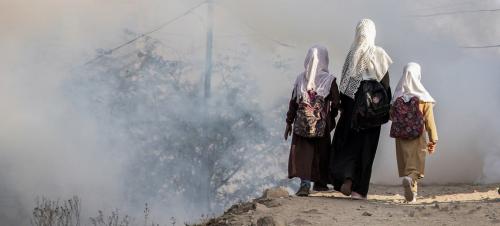Yemen war now ‘chronic emergency’ as millions face hunger
After more than seven years of war, Yemen is living in a chronic state of emergency, marked by hunger, disease and other miseries that are rising faster than aid agencies can reverse, UN relief chief Martin Griffiths told the Security Council on Tuesday, as the Special Envoy for the country called for joint efforts by Yemenis and the international community to break the entrenched cycle of violence.

Three sisters walk to their school close to a fighting zone in Taizz, Yemen, February 2021.
Emergency Relief Coordinator, Mr. Griffiths, cited grave risks for inertia and fatigue in attenuating the severe conditions in Yemen, as Russia’s invasion of Ukraine provokes new shocks and international outrage.
“We must not give in to those forces,” he insisted. He drew attention to Wednesday’s high-level pledging event to alleviate the suffering of the traumatized Yemeni people, with aid agencies seeking nearly $4.3 billion to help 17 million in 2022 alone.
New nationwide assessments confirm that 23.4 million people now need assistance – about three of every four people. Among them are 19 million people who will go hungry in the coming months – an increase of almost 20 per cent from 2021 – while more than 160,000 of them will face famine-like conditions.
Noting that Yemen relies on commercial imports for 90 per cent of its food and nearly all its fuel, he said one third of its wheat comes from Russia and Ukraine, where the conflict sparked on 24 February may push food prices, which already doubled last year, even higher.
‘Taking food from the hungry to feed the starving’
“We are looking at a seismic hunger crisis if we do not step up now,” World Food Programme (WFP) Executive Director David Beasely stressed in a statement on the eve of the high-level pledging event.
Without immediate funds, hungry people will lose assistance right at the time they need it most. The number of people in need of food is forecast to reach 19 million in the second half of the year, without fresh funds, according to the latest Integrated Phase Classification.
“Funding for Yemen has never reached this point,” he warned. “We have no choice but to take food from the hungry to feed the starving.”
Funding shortfalls force cuts
WFP was forced to reduce food rations for eight million people at the beginning of the year due to a shortage of funds, Mr. Beasley said. For now, five million people who are at immediate risk of slipping into famine conditions have continued to receive a full food ration.
WFP is currently only 11 percent funded and needs more than $887.9 million to provide food assistance for 13 million people over the coming six months.
Mr. Griffiths said more than 75 per cent of the $14 billion generated by United Nations appeals has come from six donors - the United States, Saudi Arabia, the United Kingdom, the United Arab Emirates, Germany and the European Commission – whose funds have staved off mass famine, “an important success”, he said.
“If we have one message for the world today, it is this: do not stop now,” he emphasized. Member States must demonstrate that “out of the headlines does not mean left behind”.
Artillery shelling, air strikes continue
Detailing the violence, Yemen Special Envoy Hans Grundberg, said that over the last month, artillery shelling in Taiz again inflicted civilian casualties and damage to residential buildings, while hostilities have been reported in Sa’dah and Al Dali’ governorates.
Air strikes continue, primarily on frontlines in Marib and Hajjah, he said. The UN Mission to Support the Hudaydah Agreement (UNMHA) meanwhile is working to rebuild communication between the parties, re-establish avenues for de-escalation and enhance monitoring of the ports.
“Through the ebbs and flows of the conflict, the fact remains that a military approach is not going to produce a sustainable solution,” he said.
Glimmer of political progress
Mr. Grundberg said he is exploring options with the parties for immediate de-escalation measures that could reduce violence, ease the fuel crisis and improve freedom of movement.
He also updated on the series of structured consultations launched in February, encouraged by the engagement from Yemeni political parties, components, experts and civil society representatives, and describing as “very constructive” his recent discussion with Yemen President Abdrabbuh Mansur Hadi.
Source:UN
- 171 reads
Human Rights
Ringing FOWPAL’s Peace Bell for the World:Nobel Peace Prize Laureates’ Visions and Actions

Protecting the World’s Cultural Diversity for a Sustainable Future

The Peace Bell Resonates at the 27th Eurasian Economic Summit

Declaration of World Day of the Power of Hope Endorsed by People in 158 Nations

Puppet Show I International Friendship Day 2020

